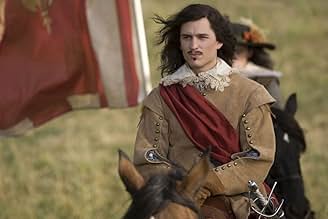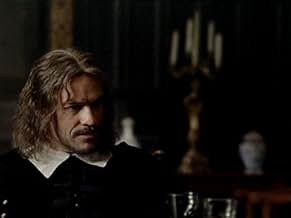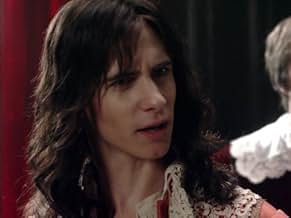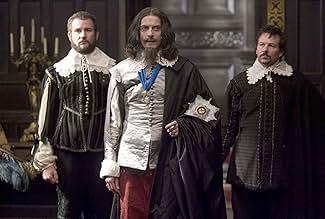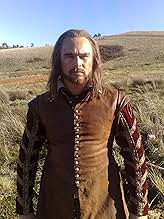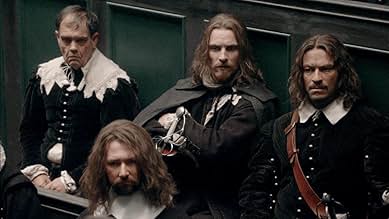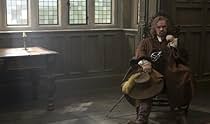The Devil's Whore
- Minissérie de televisão
- 2008
- 47 min
AVALIAÇÃO DA IMDb
7,0/10
2,8 mil
SUA AVALIAÇÃO
Adicionar um enredo no seu idiomaDrama charts the progress of the English Civil War through the story of a young woman, the fictional Angelica Fanshawe, and her three husbands.Drama charts the progress of the English Civil War through the story of a young woman, the fictional Angelica Fanshawe, and her three husbands.Drama charts the progress of the English Civil War through the story of a young woman, the fictional Angelica Fanshawe, and her three husbands.
- Ganhou 1 prêmio BAFTA
- 8 vitórias e 7 indicações no total
Explorar episódios
Avaliações em destaque
I have little knowledge of the historical period on which this is based but it gave a pretty good idea of the socio political situation. All the actors were excellent and Michael Fassbender as Thomas Rainsborough was exceptional.
Well, The Devil's Whore gets two cheers for trying – OK, make that two and a half - and if in some ways it failed, I don't think it should get all the blame. It seems that what was conceived of a 12-part series hit the financial buffers of necessity became a four-part series and, unfortunately, in many ways it shows. What finally hit the screens over four one-hour episodes is by no means bad and is most certainly very entertaining, but it is something of a mongrel, a hotch-potch of this, that and t'other. The background - well, more than the background - the whole context to what purports to be a true account of a fictional character is a period in British history which is not only fascinating but which led to the foundation of democracy throughout the world. But it was anything but straightforward: it wasn't simply a question of 'the people' rising up against 'the king' as many believe, but an intricate and complex realignment of authority and power. It began in the reign of Charles I and more or less concluded when his son, Charles II, was restored to the throne and England and Scotland once again had a monarchy. But it was a very different monarchy which now existed and over the next 150 led to the creation of parliament which Brtitain likes to boast was the template of all other parliaments. (It wasn't really, but that is here not the issue). But for a very nasty period of 20 years, Britain was convulsed by strife and civil war in which many died and which saw a great deal of death and brutality. In the Levellers, the country experienced what would later be known as communism but it also saw how privilege and property is so engrained in the fabric of this and all other countries that it takes more than ideals and violence to dislodge them. That is the background, and a 12-part series from the same team which produce this cutdown lite version might well have made a good fist of explaining the complexities of that time. In the event they don't, and what we do get at the historical and political level is akin to a primary school textbook account. The Devil's Whore is also something of a bodice-ripper, and here it perhaps scores a little more. And I suspect that element, the romance and dashing hero stuff would have found a way of fitting in quite nicely with an intelligent exposition of the English Civil War and its aftermath. The problem is that those who see The Devil's Whore might well remember that as their 'history', but it does take enormous liberties with the truth in the interests of creating rattling entertainment. Thus Thomas Rainsborough, Edward Sexby, John Lilburne and, of course, Oliver Cromwell were all historical characters, but in this version they are fictionalised to such an extent that often only their names remain what is true about them. There is also the quibble, a pretty universal fault, of coincidence: blow me do the various characters appear in just the right spot at just the right time. Right on cue. And they manage to travel some distances with no bother at all. Then there's the curious matter of the Devil, who appears, usually sitting on a tree, at the strangest moments. I assume he is the Devil for whom the heroine Angelica Fanshawe is the 'whore', but that must remained supposition as no explanation for his continued appearance is even attempted. And what about Prince Rupert, bosom pal of Angelica's first husband who even turns up in the wedding chamber on her wedding night, but then suddenly disappears from view never to be heard, seen or spoken of again. Odd. That, too, was probably a victim of the cuts from a 12-parter to a third that length. No doubt such anomalies might have been ironed out had the money been there and the series been a 12-parter after all. As it is we have to put up with outrageous suspension of disbelief. Overall, of course, and sitting side by side with other TV drama, The Devil's Whore isn't half bad and most certainly very entertaining. The pity is that for want of a penny or two more it might well have been outstanding. But that it isn't.
Excellently entertaining series with some interesting slants on the history but I appreciate that the writers did not set out to create a drama-documentary. Although they did incorporate some historical accuracy, anyone not knowing the real history of the Civil War could/would be very confused by some of the content. The real Thomas Rainsborough did not marry someone called Angelica Fanshawe and he is buried in the now disappeared graveyard of St John's, Wapping.
Pity that IMD have posted a picture of John Simm/Sexby's stand-in rather than JS/Sexby himself!!!!!
I am also totally stunned that the makers of the series insisted that they could not find suitable filming locations in the UK. I could have suggested any number of suitable locations both privately owned (but the owners have allowed filming) and NT or English Heritage. It seems amazing that with so much Tudor and Jacobean property here, not to mention forests etc that they deemed it necessary to ship cast and crew several thousand miles away to South Africa.
Pity that IMD have posted a picture of John Simm/Sexby's stand-in rather than JS/Sexby himself!!!!!
I am also totally stunned that the makers of the series insisted that they could not find suitable filming locations in the UK. I could have suggested any number of suitable locations both privately owned (but the owners have allowed filming) and NT or English Heritage. It seems amazing that with so much Tudor and Jacobean property here, not to mention forests etc that they deemed it necessary to ship cast and crew several thousand miles away to South Africa.
I can't believe that I know so little about the English Civil War and this series has stimulated me to learn more. The characters were portrayed so well that I feel I want to know so much more about those who were real people. John Simm's performance as Edward Sexby haunts me because he spent so much time longing for a relationship with Angelica, then finally reached his goal, only to move away from her again towards another greater goal. It was inspiring, and I was captivated by the visual impact and the political power of the plot. Like the West Wing, the Devil's Whore managed to make me interested in political issues that may seem dull elsewhere. Oliver Cromwell came across as a real man and most of the real historical figures were 3-dimensional. Angelica was fascinating and powerful, and it doesn't matter that she was not real historically - she held the story together. The details of the struggle between the monarch and the parliamentarians is very gripping and is at the roots of our present system of democracy - probably the model for all democracies.
As a Quaker, I need to know as much as possible about this period in English history, because out of the many religious and political groups which grew up in the turbulence of the 17th century, the Society of Friends is one that has survived adapted to modern life - something that the Ranters and Levellers were unable to do.
Overall, my main impression was one of fascination with the story of Angelica's life and Sexby's devotion to her - it was a great inspiring tale. Such a shame that it had to be cut down from 12 episodes to 4 - how much more would we have gained if we could have seen all that was planned?
As a Quaker, I need to know as much as possible about this period in English history, because out of the many religious and political groups which grew up in the turbulence of the 17th century, the Society of Friends is one that has survived adapted to modern life - something that the Ranters and Levellers were unable to do.
Overall, my main impression was one of fascination with the story of Angelica's life and Sexby's devotion to her - it was a great inspiring tale. Such a shame that it had to be cut down from 12 episodes to 4 - how much more would we have gained if we could have seen all that was planned?
THE DEVIL'S MISTRESS (The Devil's Wh*re) (2008) was a pretty interesting series, that immediately drew me in with promises to learn more of the mysteries of the English Civil War (1636 - 1660) though it didn't necessarily live up to the high expectations it set in that regard, it was however, studded with a cast of stars, who all played their parts marvelously, flaws or not and offered insights into the era's turbulence, as well as political, social, moral, religious and sexual politics of the day, if not beheld from a modern eye.
It follows Angelica Fanshawe (Andrea Riseborough), a young "modern-minded" woman who sees strange visions of the devil, as the country is about to be torn in half with the impending civil war. She is torn between her Aristocratic Catholic identity and between her rising beliefs in the Rebel Leveller cause, rising up against the dated Monarchal/Aristocratic systems.
The cast was exceptional. Andrea Riseborough, John Simm, Michael Fassbender, Dominic West, Peter Capaldi, Tom Goodman-Hill, and Maxine Peake were all very memorable in their roles which made this series worth while. My favorite acted were John Simm (as the Edward Sexby), Peter Capaldi (as King Charles I), Michael Fassbender (as Thomas Rainsborough) and Andrea Riseborough (as Angelica Fanshawe).
Overall, it was an intriguing yet somewhat melodramatic show, with a few shining exceptions. The character of Angelica was of a love-hate for me, giving me very mixed emotions. Sometimes she felt strong and wise, and other times she seemed whiney and naive. Also, the series tried to imply she loved "men of ideas", but more often than not it seemed her "loves" were "lust at first sight" variety and not very deep at all. I was however, a fan of the tragic, scarred, grey colored, and somewhat cruel character of Edward Sexby (John Simm). He made for an interesting anti-hero, a man that you both fear and root for. His character is one you can deeply brood over, impossibly sad, hopeless and yet inspiring. You want him to find redemption and love, but he walks a tragic path indeed. The pair have an unspeakable chemistry and unique bond, making it impossibly difficult to look away when either / both are on screen. Highly effective technique.
The series was really moving and memorable, highlighting historical events and showcasing the darkers sides of human natures, but too often lowered itself into scenes of melodrama and gratuitous titilation, rather than focusing on the characters development and factual historical events, and the few historical events shown seemed lightly brushed over and not given the time desserved. Perhaps this was due to lower budget or time contraints or both? This series would have been so much greater if given more time and episodes. But still overall, a highly enjoyable series of two tragic figures living through a horrible war and torn country, with divided morals and questionable loyalties, that lingers on in the mind.
It follows Angelica Fanshawe (Andrea Riseborough), a young "modern-minded" woman who sees strange visions of the devil, as the country is about to be torn in half with the impending civil war. She is torn between her Aristocratic Catholic identity and between her rising beliefs in the Rebel Leveller cause, rising up against the dated Monarchal/Aristocratic systems.
The cast was exceptional. Andrea Riseborough, John Simm, Michael Fassbender, Dominic West, Peter Capaldi, Tom Goodman-Hill, and Maxine Peake were all very memorable in their roles which made this series worth while. My favorite acted were John Simm (as the Edward Sexby), Peter Capaldi (as King Charles I), Michael Fassbender (as Thomas Rainsborough) and Andrea Riseborough (as Angelica Fanshawe).
Overall, it was an intriguing yet somewhat melodramatic show, with a few shining exceptions. The character of Angelica was of a love-hate for me, giving me very mixed emotions. Sometimes she felt strong and wise, and other times she seemed whiney and naive. Also, the series tried to imply she loved "men of ideas", but more often than not it seemed her "loves" were "lust at first sight" variety and not very deep at all. I was however, a fan of the tragic, scarred, grey colored, and somewhat cruel character of Edward Sexby (John Simm). He made for an interesting anti-hero, a man that you both fear and root for. His character is one you can deeply brood over, impossibly sad, hopeless and yet inspiring. You want him to find redemption and love, but he walks a tragic path indeed. The pair have an unspeakable chemistry and unique bond, making it impossibly difficult to look away when either / both are on screen. Highly effective technique.
The series was really moving and memorable, highlighting historical events and showcasing the darkers sides of human natures, but too often lowered itself into scenes of melodrama and gratuitous titilation, rather than focusing on the characters development and factual historical events, and the few historical events shown seemed lightly brushed over and not given the time desserved. Perhaps this was due to lower budget or time contraints or both? This series would have been so much greater if given more time and episodes. But still overall, a highly enjoyable series of two tragic figures living through a horrible war and torn country, with divided morals and questionable loyalties, that lingers on in the mind.
Você sabia?
- CuriosidadesMark Gatiss had a interview for the role of John Thurloe.
- ConexõesVersion of Novos mundos (2014)
Principais escolhas
Faça login para avaliar e ver a lista de recomendações personalizadas
- How many seasons does The Devil's Mistress have?Fornecido pela Alexa
Detalhes
- Data de lançamento
- Países de origem
- Central de atendimento oficial
- Idioma
- Também conhecido como
- The Devil's Mistress
- Locações de filme
- Empresas de produção
- Consulte mais créditos da empresa na IMDbPro
Contribua para esta página
Sugerir uma alteração ou adicionar conteúdo ausente

